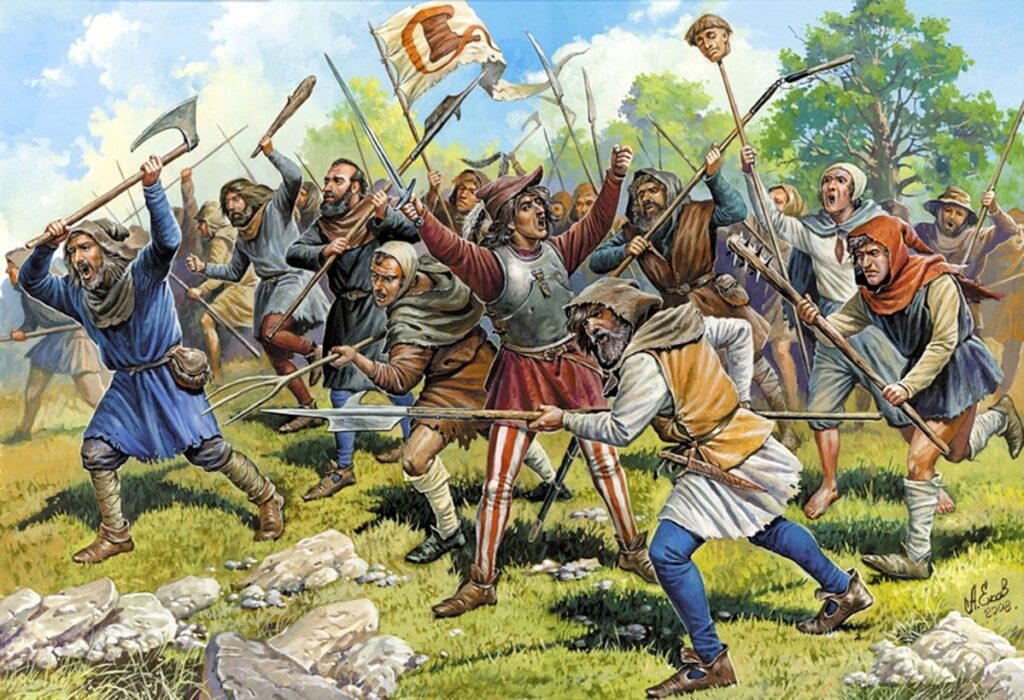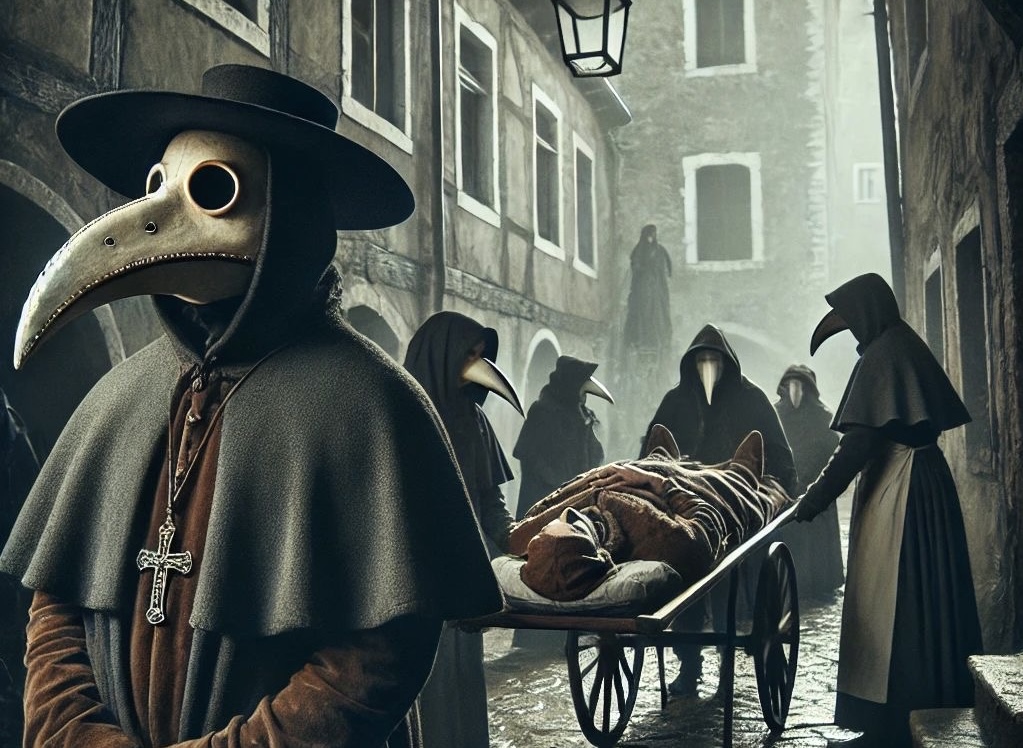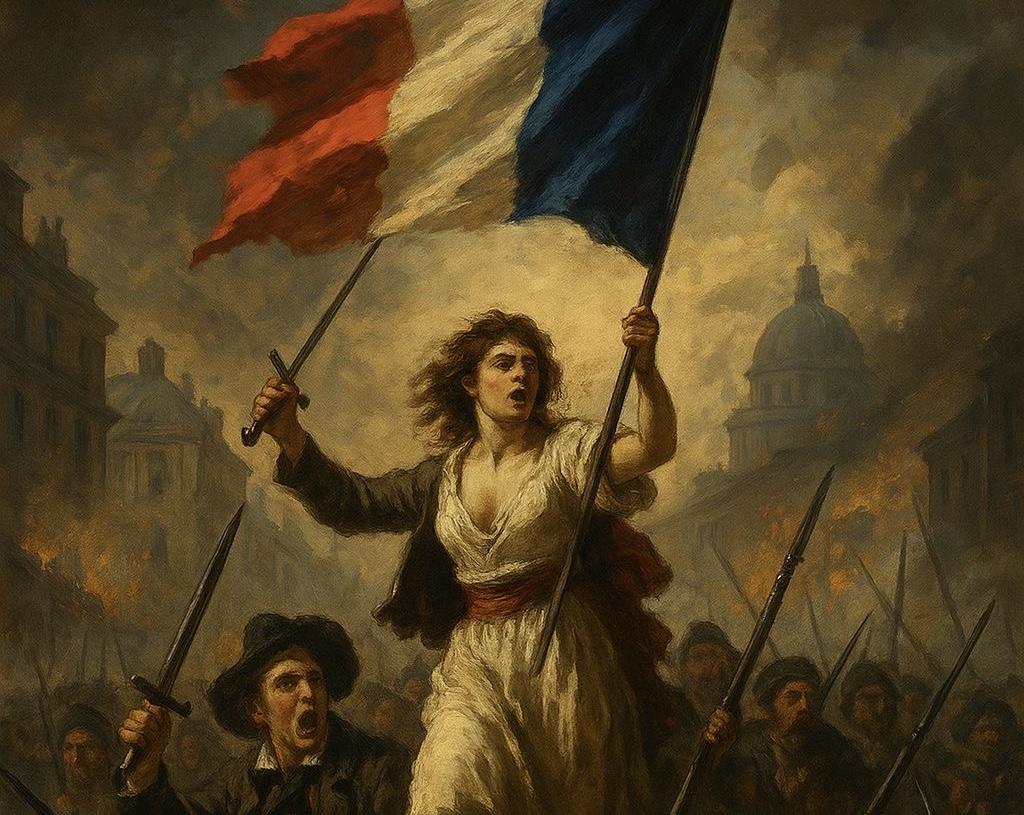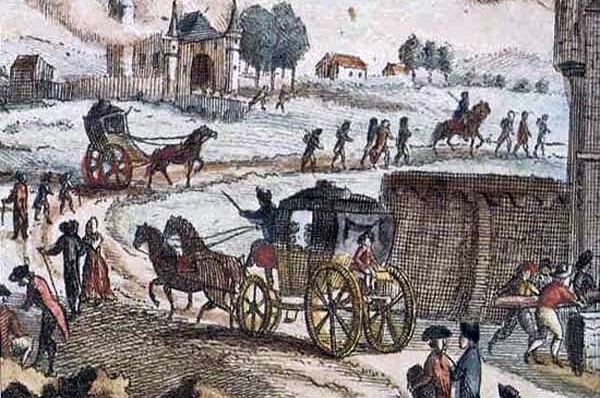Let’s imagine we are in the 14th century, you wake up one morning, step out of your wooden cottage, and realize that half of your village is gone. The fields are empty, the church bells are tolling nonstop for funerals, and every single street reeks of sickness.
What you just imagined happened, not in a movie scene, but in real life. It was Europe during the Black Death, the deadliest pandemic the world had ever seen.
Between 1347 and 1351, the plague claimed the lives of nearly half of Europe’s population. However, there is a twist; the story did not end with survivors quietly rebuilding their lives.
Instead, they discovered something powerful. They discovered that without them, the entire feudal system would have fallen apart. To explain this, let’s backtrack a bit.
Back in the Middle Ages, Europe had a system called feudalism, which was like a giant pyramid with kings and nobles at the top, lords below them, and at the very bottom were peasants, who were ordinary farmers and workers.
The peasants did most of the work, including farming, building, and tending animals, while the lords owned the land and took a big share of whatever the peasants produced. In essence, everyone depended on the peasants, but peasants didn’t have much freedom.
So, when the Black Death came and wiped out nearly half of Europe’s people, the pyramid was shaken to its core. There weren’t enough workers, so crops started rotting, animals were left unattended, there weren’t enough people to build roads or keep life going, and the lords could not collect food or money from empty villages.
This was when peasants discovered that the entire system relied solely on them. No peasants basically meant no food, no wealth, and no power for the lords. And so began what we now call the Black Death rebellion; a wave of uprisings and revolts where peasants who were tired of their lord’s demands, fought back for better wages, more freedom, and a new social order.
This wasn’t just about rats and fleas spreading diseases; it was about how desperation turned into defiance. Let’s delve into how the plague reshaped Europe, not just through death, but also through rebellion.
The system worked well back then, at least it worked well for the wealthy, because there were many peasants to till the earth, plow, sow, and harvest.
Life Before the Plague: Trapped in Feudalism
If you were a peasant in Europe in the early 1300s, your life would look like this:

- Wake up at dawn
- Work the lord’s fields every day
- Give him a share of your crops as “rent”
- Maybe keep enough bread to feed your family
- Repeat the process until you die.
There wasn’t much room for peasants to climb the social ladder. They couldn’t just pack their bags and move to another village; they were tied to the land. The system worked well back then, at least for the wealthy, because there were many peasants to till the earth, plow, sow, and harvest.
However, when the plague struck, this fragile system was on the verge of collapsing.
The Black Death Arrives
The plague arrived in Europe in 1347. It was carried by fleas on rats that hitched rides on merchant ships that came from Asia. The plagues spread like wildfire. People wake up with fevers, black swellings under their arms, and within days or sometimes hours, they die. The plague caused the death of so many people that entire villages became empty.

But while the continuous death of peasants spread terror, survival created opportunity. When the plague finally slowed, survivors looked around and realized some things. They saw that:
- Half of the workers were dead
- The fields were abandoned
- Lords were desperate for labor.
And suddenly, it hit them. They, the peasants who were once powerless, held all the cards.
Shortage of Labor: The Great Peasant Power Shift
This is where things get interesting.
With many workers absent, the supply of labor drastically reduced, and demand for it skyrocketed. Wages rose, with some increases doubling and others tripling. Peasants could make demands for things like meat in their diet, better housing, and even cash payments instead of endless free labor. For the first time, they had a glimpse of freedom.
However, as expected, the nobles hated this shift. Their wealth and power heavily relied on cheap labor, so they fought back, not with swords at first, but with laws.
Across Europe, similar laws attempted to freeze wages, force peasants to return to their traditional lives, and keep them there.
Lords Strike Back: The Statute of Laborers
In England, King Edward III passed the Statute of Laborers in 1351. These laws basically said the following:
- Wages must go back to what they were before the plague
- Peasants cannot leave their lord’s land
- If you demand higher pay, you will automatically become a criminal.
Imagine surviving the worst plague in history, finally realizing that your work is worth more, and then they tell you, “Nope, you will still get meagre payments.” Just imagine!
That law lit the fuse of rebellion.
Across Europe, similar laws attempted to freeze wages, force peasants to return to their traditional lives, and keep them there. But there was a problem with that plan. The people had already tasted power, and they were not about to give it up.
The Uprisings Begin
The tension exploded into full-on uprisings. The following are some of the events that occurred in certain parts of Europe:

1. The Jacquerie (France, 1358)
In northern France, some peasants known as the “Jacques” rose against the lords. They were angry at the high taxes, feudal oppression, and nobles who had failed to protect them from English raids during the Hundred Years’ War.
Under leaders like Wat Tyler and John Ball, the peasants marched to London chanting, “When Adam delved and Eve span, who was then the gentleman?“
They attacked manor houses, burned castles, and killed nobles. Although the rebellion was brutally crushed, it sent a clear message: peasants were no longer staying silent.
2. The Peasants’ Revolt (England, 1381)
This is the most famous rebellion of all.
The English peasants were totally fed up with the wage restrictions that were placed on them and a poll tax they hated, a flat tax that hurt the poor the most.
Under leaders like Wat Tyler and John Ball, the peasants marched to London chanting, “When Adam delved and Eve span, who was then the gentleman?” They were basically saying, “Why should nobles rule when everyone came from the same first parents?“
The rebels stormed London. They burned tax records and executed officials. For a brief moment, it looked like they had won, but when they met King Richard II, things took a left turn. Wat Tyler was killed during negotiations, the rebels lost their leader, and the revolt collapsed. However, the rebellion left a lasting mark; its memory haunted England’s rulers for centuries.
3. Revolts Across Europe
From Italy to Germany, waves of uprisings also followed. Although each rebellion was ultimately crushed, it still had an impact on feudalism, as each revolt chipped away at the power of feudalism. Lords realized that they could no longer rule with absolute control.
How the Black Death Reshaped Society
So, what did all this rebellion achieve? It actually achieved a lot more than you think.

1. Higher Wages
After a while, peasants started getting more for their labor. Despite laws like the Statute of Laborers, the labor shortage was too strong to ignore. Over time, wages increased, and peasants gained bargaining power.
2. End of Serfdom
In Western Europe, serfdom began to decline. By the 15th century, many peasants were free tenants who paid rent instead of working as bound labor.
From the French Revolution to the workers’’rights we have now, effects of the Black Death rebellion can still be felt today.
3. Rise of Cities
Many peasants fled to towns, where they found freedom and jobs, and from there, cities grew, which in turn increased trade, crafts, and eventually led to the Renaissance.
4. Shift in Power
Eventually, nobles lost their wealth as the cost of labor significantly increased. This led to kings gaining more power, paving the way for the emergence of modern states.
5. Seeds of Rebellion
To this very day, the idea that common people could rise did not entirely vanish. From the French Revolution to the workers’ rights we have now, echoes of the Black Death rebellion can still be felt today.
The peasants of the 14th century may not have had hashtags or unions, but they understood something powerful.
The Black Death was not just about death; it was about change. It shows us that when old systems no longer work, ordinary people can challenge power.
Today, we often see such incidents occur after specific crises have occurred. Think of how the COVID-19 pandemic reshaped work, wages, and labor movements. The peasants of the 14th century may not have had hashtags or unions, but they understood something powerful. They knew and understood that survival gave them leverage, and leverage could spark rebellion.
A Human Story of Defiance
The Black Death rebellion was not just about lost wages. It was about people realizing their worth. A farmer who once thought he was stuck being a farmer for life could suddenly imagine a different future.
It is not just a tale of rats, fleas, and coffins; it is the story of how, out of the world’s darkest plague, people found the courage to demand something better. Although the Black Death wiped out millions of people, it also cracked open the chains of feudalism.
The uprisings of peasants across Europe in the 14th century demonstrated that crises can serve as a catalyst. Even though lords tried to drag peasants back into the past, as they wanted things to be as they used to be, rebellion pushed Europe forward. It pushed it toward freedom, toward change, and toward a world where ordinary people had a voice.
So, the next time you hear about the plague, don’t just picture death and despair. Picture a peasant with dirt on his boots, standing up to his lord, saying, “My work matters, my life matters, and I will not go back.“
That is the legacy of the Black Death rebellion; it is also the reason why it still matters today.
What do you think? Were the peasants heroes for standing up to their lords, or just desperate survivors, trying to grab their chance? We would love to hear your take. Drop your thoughts in the comments, and share the story with a friend; let’s keep the rebellion alive in conversation!

